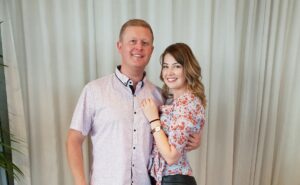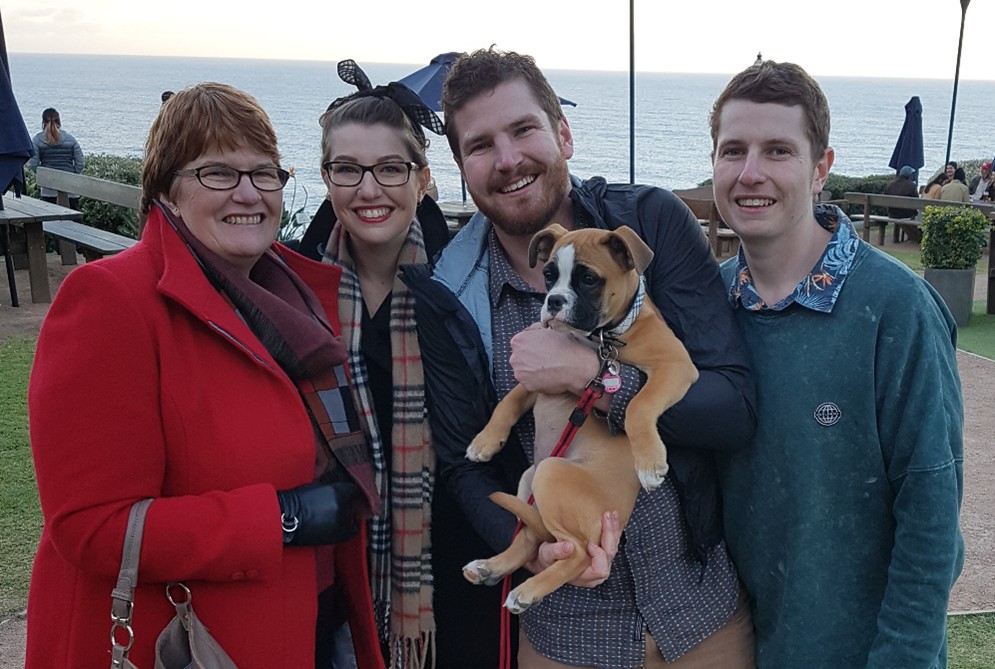For 24-year-old Alicia, it was a confusing and emotional path to diagnosisthe process of identifying a disease based on signs and symptoms, patient history and medical test results of a rare ovarian cancera disease where abnormal cells split without control and spread to other nearby body tissue and/or organs.
In November of 2015, Alicia started to experience early pregnancy symptoms despite being on contraception. She took a pregnancy test at home, and it came back positive. Confused, she visited her doctor for advice.
Her doctor suspected an ectopic pregnancy, but two ultrasounds and a laproscopy could not confirm the presence of a fetus. There seemed to be no obvious reason for her persistently rising hCG (pregnancy hormonea chemical substance produced by glands in the endocrine system that regulates various functions in the body) levels. In the absence of any other clear explanation, Alicia was administered a shot to ‘correct’ what doctors could only conclude was an ectopic pregnancy that they’d missed.
“I asked the doctors multiple times if my hCG levels could be related to anything other than pregnancy and they all said no. I went home and had a sense of mourning for the fetus I thought I had lost. I sat with a lot of guilt about this loss of potential life, even though I wasn’t ready for kids at that stage. It was a very confusing time for me.”
A few days later, her hCG levels had risen once again and were at the level of a woman in her third trimester.
“At this stage, trying to stop me from crying was like trying to stop a train with a feather.”

Surgerytreatment involving removal of cancerous tissue and/or tumours and a margin of healthy tissue around it to reduce recurrence revealed that Alicia’s left ovary had increased in size at an alarming rate. The doctors concluded that an ectopic pregnancy must have persisted and was developing inside her ovary. The massa growth of cells that come together to make a lump, may or may not be cancer was removed, and Alicia was sent home to recover from the physical and emotional rollercoaster.
“I got a call from my surgeon a few days later asking me to return to the hospital for a ‘follow-up’; which I now know is never a good sign. When I attended he told me, ‘You have officially become the most interesting person I know’. I didn’t like the sound of that.”
“He told me the mass they removed from my ovary was not a fetus, it was in fact a tumoura tissue mass that forms from groups of unhealthy cells. I hoped it was benignnot cancerous, can grow but will not spread to other body parts, but he said, ‘Oh no…no, no it’s cancerous, very aggressive, very dangerous.’ At this point I could only hear ringing in my ears, and I was acutely aware that I had no one there with me.”
“I asked if they got it all, and what happens now. My doctor said, ‘I don’t know, I’m not an oncologista doctor who specialises in the study, diagnosis and treatment of cancer so I can’t tell you the next steps, you might have to have chemo, you may not, you may need another surgery, you might be able to get away with doing nothing. I have booked you in with an oncologist who will be able to tell you more.’”
“A day later I was officially diagnosed with an extremely rare non-gestational choriocarcinoma of the ovary. This type of cancer, which typically grows in the uterus, is very hard to detect until it has developed into a late-stage cancer. It growing in my ovary saved my life because it tricked my body into thinking it was pregnant, which caused the persistently high hCG levels. The doctors couldn’t explain those levels so they had to keep investigating, and that’s what led to the discovery of the tumour.”
“Hopefully my case will lead to other women being correctly diagnosed earlier in the process. If you are not pregnant, persistently rising hCG levels need to be investigated further to find the source.”

Alicia underwent surgery again, with her left ovary and fallopian tube removed to prevent the cancer returning, as well as three rounds of chemotherapya cancer treatment that uses drugs to kill or slow the growth of cancer cells, while minimising damage to healthy cells.
“I also had to contend with the weird sensation of still feeling sad for an unborn baby which had never actually existed.”
In remissiona reduction or absence of symptoms in disease, can be partial or complete for over five years now, Alicia considers herself to be cancer-free, but the impact of the ordeal remains.
“Despite the short course of treatment, it is impossible to ignore the long term emotional and even physical side effects. It took me a long time to regain my ability to focus, I now suffer heartburn where I never did before, and the psychological trauma hasn’t totally gone away.”
“Mental health is really important to me. You have counsellors come to see you when you get diagnosed, but the trauma hasn’t really set in, so you say you’re ok and it’s left there. For me, it wasn’t until after treatment ended that I started to suffer mentally, because ‘picking up where I left off’ and ‘getting back to normal’ never happened.”
“I was resentful of my cancer because it had robbed me of a lot, and I didn’t get the appropriate mental health care because no one follows up with you post-treatment. I understand the health system is stretched, and everyone I came into contact with was lovely and just trying to do their best. But I do think it’s an area of the health care system that needs to be revised. If a cancer counsellor called me after treatment, maybe I could have started my emotional healing earlier, before it got too bad.”

Alicia credits her incredible support network of family and friends for getting her through that time.
“What really helped was being treated normally. I didn’t want to feel like a patient or someone you had to be careful around. I wanted to have normal conversations with people, make jokes and even take my diagnosis a little less seriously.”
“Working at RCA has also been wonderful. Hearing the stories of so many incredible, strong people has been an eye-opening experience. I was lucky; despite the rarity of my cancer I had access to treatment and a good prognosisto predict how a disease/condition may progress and what the outcome might be. That is the outcome all cancer patients should have. No treatment should be out of reach for a person with cancer, and if I can do anything to help that dream become a reality I will.”
Alicia’s message to other rare cancer patients is simple: don’t suffer in silence with ongoing effects from diagnosis or treatment.
“You shouldn’t have to live in fear every day of your cancer returning, or panic from every twinge you feel. Please reach out for support. A lot of patients that we support at RCA have these same fears, so you are not alone. And remember that your worth is outside of your diagnosis; you are not your cancer.”
